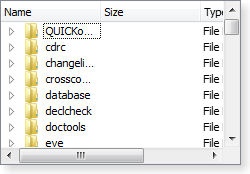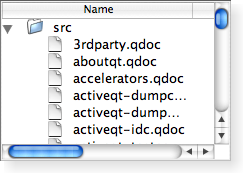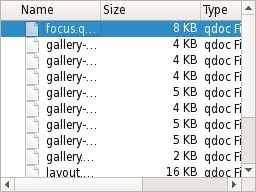QTreeWidget Class
The QTreeWidget class provides a tree view that uses a predefined tree model. 更多...
| 头文件: | #include <QTreeWidget> |
| qmake: | QT += widgets |
| 基类: | QTreeView |
属性
- columnCount : int
- topLevelItemCount : const int
- 11 个属性继承自 QTreeView
- 16 个属性继承自 QAbstractItemView
- 3 个属性继承自 QAbstractScrollArea
- 6 个属性继承自 QFrame
- 59 个属性继承自 QWidget
- 1 个属性继承自 QObject
公有函数
| QTreeWidget(QWidget *parent = Q_NULLPTR) | |
| ~QTreeWidget() | |
| void | addTopLevelItem(QTreeWidgetItem *item) |
| void | addTopLevelItems(const QList<QTreeWidgetItem *> &items) |
| void | closePersistentEditor(QTreeWidgetItem *item, int column = 0) |
| int | columnCount() const |
| int | currentColumn() const |
| QTreeWidgetItem * | currentItem() const |
| void | editItem(QTreeWidgetItem *item, int column = 0) |
| QList<QTreeWidgetItem *> | findItems(const QString &text, Qt::MatchFlags flags, int column = 0) const |
| QTreeWidgetItem * | headerItem() const |
| int | indexOfTopLevelItem(QTreeWidgetItem *item) const |
| void | insertTopLevelItem(int index, QTreeWidgetItem *item) |
| void | insertTopLevelItems(int index, const QList<QTreeWidgetItem *> &items) |
| QTreeWidgetItem * | invisibleRootItem() const |
| bool | isFirstItemColumnSpanned(const QTreeWidgetItem *item) const |
| QTreeWidgetItem * | itemAbove(const QTreeWidgetItem *item) const |
| QTreeWidgetItem * | itemAt(const QPoint &p) const |
| QTreeWidgetItem * | itemAt(int x, int y) const |
| QTreeWidgetItem * | itemBelow(const QTreeWidgetItem *item) const |
| QWidget * | itemWidget(QTreeWidgetItem *item, int column) const |
| void | openPersistentEditor(QTreeWidgetItem *item, int column = 0) |
| void | removeItemWidget(QTreeWidgetItem *item, int column) |
| QList<QTreeWidgetItem *> | selectedItems() const |
| void | setColumnCount(int columns) |
| void | setCurrentItem(QTreeWidgetItem *item) |
| void | setCurrentItem(QTreeWidgetItem *item, int column) |
| void | setCurrentItem(QTreeWidgetItem *item, int column, QItemSelectionModel::SelectionFlags command) |
| void | setFirstItemColumnSpanned(const QTreeWidgetItem *item, bool span) |
| void | setHeaderItem(QTreeWidgetItem *item) |
| void | setHeaderLabel(const QString &label) |
| void | setHeaderLabels(const QStringList &labels) |
| void | setItemWidget(QTreeWidgetItem *item, int column, QWidget *widget) |
| int | sortColumn() const |
| void | sortItems(int column, Qt::SortOrder order) |
| QTreeWidgetItem * | takeTopLevelItem(int index) |
| QTreeWidgetItem * | topLevelItem(int index) const |
| int | topLevelItemCount() const |
| QRect | visualItemRect(const QTreeWidgetItem *item) const |
重新实现的公有函数
| virtual void | setSelectionModel(QItemSelectionModel *selectionModel) |
- 52 个公有函数继承自 QTreeView
- 59 个公有函数继承自 QAbstractItemView
- 20 个公有函数继承自 QAbstractScrollArea
- 14 个公有函数继承自 QFrame
- 214 个公有函数继承自 QWidget
- 32 个公有函数继承自 QObject
- 14 个公有函数继承自 QPaintDevice
公有槽函数
| void | clear() |
| void | collapseItem(const QTreeWidgetItem *item) |
| void | expandItem(const QTreeWidgetItem *item) |
| void | scrollToItem(const QTreeWidgetItem *item, QAbstractItemView::ScrollHint hint = EnsureVisible) |
- 8 个公有槽函数继承自 QTreeView
- 9 个公有槽函数继承自 QAbstractItemView
- 19 个公有槽函数继承自 QWidget
- 1 个公有槽函数继承自 QObject
信号
| void | currentItemChanged(QTreeWidgetItem *current, QTreeWidgetItem *previous) |
| void | itemActivated(QTreeWidgetItem *item, int column) |
| void | itemChanged(QTreeWidgetItem *item, int column) |
| void | itemClicked(QTreeWidgetItem *item, int column) |
| void | itemCollapsed(QTreeWidgetItem *item) |
| void | itemDoubleClicked(QTreeWidgetItem *item, int column) |
| void | itemEntered(QTreeWidgetItem *item, int column) |
| void | itemExpanded(QTreeWidgetItem *item) |
| void | itemPressed(QTreeWidgetItem *item, int column) |
| void | itemSelectionChanged() |
- 2 个信号继承自 QTreeView
- 7 个信号继承自 QAbstractItemView
- 3 个信号继承自 QWidget
- 2 个信号继承自 QObject
受保护的函数
| virtual bool | dropMimeData(QTreeWidgetItem *parent, int index, const QMimeData *data, Qt::DropAction action) |
| QModelIndex | indexFromItem(const QTreeWidgetItem *item, int column = 0) const |
| QTreeWidgetItem * | itemFromIndex(const QModelIndex &index) const |
| virtual QMimeData * | mimeData(const QList<QTreeWidgetItem *> items) const |
| virtual QStringList | mimeTypes() const |
| virtual Qt::DropActions | supportedDropActions() const |
重新实现的受保护函数
- 29 个受保护的函数继承自 QTreeView
- 37 个受保护的函数继承自 QAbstractItemView
- 20 个受保护的函数继承自 QAbstractScrollArea
- 4 个受保护的函数继承自 QFrame
- 35 个受保护的函数继承自 QWidget
- 9 个受保护的函数继承自 QObject
- 1 个受保护的函数继承自 QPaintDevice
其他继承的成员
- 1 个公有变量继承自 QObject
- 5 个静态公有成员继承自 QWidget
- 10 个静态公有成员继承自 QObject
- 4 个受保护的槽函数继承自 QTreeView
- 9 个受保护的槽函数继承自 QAbstractItemView
- 1 个受保护的槽函数继承自 QWidget
- 2 个受保护的变量继承自 QObject
- 1 protected type inherited from QPaintDevice
详细描述
The QTreeWidget class provides a tree view that uses a predefined tree model.
The QTreeWidget class is a convenience class that provides a standard tree widget with a classic item-based interface similar to that used by the QListView class in Qt 3. This class is based on Qt's Model/View architecture and uses a default model to hold items, each of which is a QTreeWidgetItem.
Developers who do not need the flexibility of the Model/View framework can use this class to create simple hierarchical lists very easily. A more flexible approach involves combining a QTreeView with a standard item model. This allows the storage of data to be separated from its representation.
In its simplest form, a tree widget can be constructed in the following way:
QTreeWidget *treeWidget = new QTreeWidget(); treeWidget->setColumnCount(1); QList<QTreeWidgetItem *> items; for (int i = 0; i < 10; ++i) items.append(new QTreeWidgetItem((QTreeWidget*)0, QStringList(QString("item: %1").arg(i)))); treeWidget->insertTopLevelItems(0, items);
Before items can be added to the tree widget, the number of columns must be set with setColumnCount(). This allows each item to have one or more labels or other decorations. The number of columns in use can be found with the columnCount() function.
The tree can have a header that contains a section for each column in the widget. It is easiest to set up the labels for each section by supplying a list of strings with setHeaderLabels(), but a custom header can be constructed with a QTreeWidgetItem and inserted into the tree with the setHeaderItem() function.
The items in the tree can be sorted by column according to a predefined sort order. If sorting is enabled, the user can sort the items by clicking on a column header. Sorting can be enabled or disabled by calling setSortingEnabled(). The isSortingEnabled() function indicates whether sorting is enabled.
 |  |  |
| A Windows Vista style tree widget. | A Macintosh style tree widget. | A Fusion style tree widget. |
参见 QTreeWidgetItem, QTreeWidgetItemIterator, QTreeView, Model/View Programming, and Settings Editor Example.
属性
columnCount : int
This property holds the number of columns displayed in the tree widget
By default, this property has a value of 1.
访问函数:
| int | columnCount() const |
| void | setColumnCount(int columns) |
topLevelItemCount : const int
This property holds the number of top-level items
By default, this property has a value of 0.
访问函数:
| int | topLevelItemCount() const |
参见 columnCount() and currentItem().
成员函数
QTreeWidget::QTreeWidget(QWidget *parent = Q_NULLPTR)
Constructs a tree widget with the given parent.
QTreeWidget::~QTreeWidget()
Destroys the tree widget and all its items.
void QTreeWidget::addTopLevelItem(QTreeWidgetItem *item)
Appends the item as a top-level item in the widget.
This function was introduced in Qt 4.1.
参见 insertTopLevelItem().
void QTreeWidget::addTopLevelItems(const QList<QTreeWidgetItem *> &items)
Appends the list of items as a top-level items in the widget.
参见 insertTopLevelItems().
[slot] void QTreeWidget::clear()
Clears the tree widget by removing all of its items and selections.
Note: Since each item is removed from the tree widget before being deleted, the return value of QTreeWidgetItem::treeWidget() will be invalid when called from an item's destructor.
参见 takeTopLevelItem(), topLevelItemCount(), and columnCount().
void QTreeWidget::closePersistentEditor(QTreeWidgetItem *item, int column = 0)
Closes the persistent editor for the item in the given column.
This function has no effect if no persistent editor is open for this combination of item and column.
参见 openPersistentEditor().
[slot] void QTreeWidget::collapseItem(const QTreeWidgetItem *item)
Closes the item. This causes the tree containing the item's children to be collapsed.
参见 expandItem(), currentItem(), itemAt(), and topLevelItem().
int QTreeWidget::currentColumn() const
Returns the current column in the tree widget.
This function was introduced in Qt 4.1.
参见 setCurrentItem() and columnCount().
QTreeWidgetItem *QTreeWidget::currentItem() const
Returns the current item in the tree widget.
参见 setCurrentItem() and currentItemChanged().
[signal] void QTreeWidget::currentItemChanged(QTreeWidgetItem *current, QTreeWidgetItem *previous)
This signal is emitted when the current item changes. The current item is specified by current, and this replaces the previous current item.
参见 setCurrentItem().
[virtual protected] void QTreeWidget::dropEvent(QDropEvent *event)
重新实现 QWidget::dropEvent().
[virtual protected] bool QTreeWidget::dropMimeData(QTreeWidgetItem *parent, int index, const QMimeData *data, Qt::DropAction action)
Handles the data supplied by a drag and drop operation that ended with the given action in the index in the given parent item.
The default implementation returns true if the drop was successfully handled by decoding the mime data and inserting it into the model; otherwise it returns false.
参见 supportedDropActions().
void QTreeWidget::editItem(QTreeWidgetItem *item, int column = 0)
Starts editing the item in the given column if it is editable.
[virtual protected] bool QTreeWidget::event(QEvent *e)
重新实现 QObject::event().
[slot] void QTreeWidget::expandItem(const QTreeWidgetItem *item)
Expands the item. This causes the tree containing the item's children to be expanded.
参见 collapseItem(), currentItem(), itemAt(), topLevelItem(), and itemExpanded().
QList<QTreeWidgetItem *> QTreeWidget::findItems(const QString &text, Qt::MatchFlags flags, int column = 0) const
Returns a list of items that match the given text, using the given flags, in the given column.
QTreeWidgetItem *QTreeWidget::headerItem() const
Returns the item used for the tree widget's header.
参见 setHeaderItem().
[protected] QModelIndex QTreeWidget::indexFromItem(const QTreeWidgetItem *item, int column = 0) const
Returns the QModelIndex associated with the given item in the given column.
Note: In Qt versions prior to 5.7, this function took a non-const item.
参见 itemFromIndex() and topLevelItem().
int QTreeWidget::indexOfTopLevelItem(QTreeWidgetItem *item) const
Returns the index of the given top-level item, or -1 if the item cannot be found.
参见 sortItems() and topLevelItemCount().
void QTreeWidget::insertTopLevelItem(int index, QTreeWidgetItem *item)
Inserts the item at index in the top level in the view.
If the item has already been inserted somewhere else it won't be inserted.
参见 addTopLevelItem() and columnCount().
void QTreeWidget::insertTopLevelItems(int index, const QList<QTreeWidgetItem *> &items)
Inserts the list of items at index in the top level in the view.
Items that have already been inserted somewhere else won't be inserted.
This function was introduced in Qt 4.1.
参见 addTopLevelItems().
QTreeWidgetItem *QTreeWidget::invisibleRootItem() const
Returns the tree widget's invisible root item.
The invisible root item provides access to the tree widget's top-level items through the QTreeWidgetItem API, making it possible to write functions that can treat top-level items and their children in a uniform way; for example, recursive functions.
This function was introduced in Qt 4.2.
bool QTreeWidget::isFirstItemColumnSpanned(const QTreeWidgetItem *item) const
Returns true if the given item is set to show only one section over all columns; otherwise returns false.
This function was introduced in Qt 4.3.
参见 setFirstItemColumnSpanned().
QTreeWidgetItem *QTreeWidget::itemAbove(const QTreeWidgetItem *item) const
Returns the item above the given item.
This function was introduced in Qt 4.3.
[signal] void QTreeWidget::itemActivated(QTreeWidgetItem *item, int column)
This signal is emitted when the user activates an item by single- or double-clicking (depending on the platform, i.e. on the QStyle::SH_ItemView_ActivateItemOnSingleClick style hint) or pressing a special key (e.g., Enter).
The specified item is the item that was clicked, or 0 if no item was clicked. The column is the item's column that was clicked, or -1 if no item was clicked.
QTreeWidgetItem *QTreeWidget::itemAt(const QPoint &p) const
Returns a pointer to the item at the coordinates p. The coordinates are relative to the tree widget's viewport().
参见 visualItemRect().
QTreeWidgetItem *QTreeWidget::itemAt(int x, int y) const
This is an overloaded function.
Returns a pointer to the item at the coordinates (x, y). The coordinates are relative to the tree widget's viewport().
QTreeWidgetItem *QTreeWidget::itemBelow(const QTreeWidgetItem *item) const
Returns the item visually below the given item.
This function was introduced in Qt 4.3.
[signal] void QTreeWidget::itemChanged(QTreeWidgetItem *item, int column)
This signal is emitted when the contents of the column in the specified item changes.
[signal] void QTreeWidget::itemClicked(QTreeWidgetItem *item, int column)
This signal is emitted when the user clicks inside the widget.
The specified item is the item that was clicked. The column is the item's column that was clicked. If no item was clicked, no signal will be emitted.
[signal] void QTreeWidget::itemCollapsed(QTreeWidgetItem *item)
This signal is emitted when the specified item is collapsed so that none of its children are displayed.
Note: This signal will not be emitted if an item changes its state when collapseAll() is invoked.
参见 QTreeWidgetItem::isExpanded(), itemExpanded(), and collapseItem().
[signal] void QTreeWidget::itemDoubleClicked(QTreeWidgetItem *item, int column)
This signal is emitted when the user double clicks inside the widget.
The specified item is the item that was clicked, or 0 if no item was clicked. The column is the item's column that was clicked. If no item was double clicked, no signal will be emitted.
[signal] void QTreeWidget::itemEntered(QTreeWidgetItem *item, int column)
This signal is emitted when the mouse cursor enters an item over the specified column. QTreeWidget mouse tracking needs to be enabled for this feature to work.
[signal] void QTreeWidget::itemExpanded(QTreeWidgetItem *item)
This signal is emitted when the specified item is expanded so that all of its children are displayed.
Note: This signal will not be emitted if an item changes its state when expandAll() is invoked.
参见 setItemExpanded(), QTreeWidgetItem::isExpanded(), itemCollapsed(), and expandItem().
[protected] QTreeWidgetItem *QTreeWidget::itemFromIndex(const QModelIndex &index) const
Returns a pointer to the QTreeWidgetItem associated with the given index.
参见 indexFromItem().
[signal] void QTreeWidget::itemPressed(QTreeWidgetItem *item, int column)
This signal is emitted when the user presses a mouse button inside the widget.
The specified item is the item that was clicked, or 0 if no item was clicked. The column is the item's column that was clicked, or -1 if no item was clicked.
[signal] void QTreeWidget::itemSelectionChanged()
This signal is emitted when the selection changes in the tree widget. The current selection can be found with selectedItems().
QWidget *QTreeWidget::itemWidget(QTreeWidgetItem *item, int column) const
Returns the widget displayed in the cell specified by item and the given column.
This function was introduced in Qt 4.1.
参见 setItemWidget().
[virtual protected] QMimeData *QTreeWidget::mimeData(const QList<QTreeWidgetItem *> items) const
Returns an object that contains a serialized description of the specified items. The format used to describe the items is obtained from the mimeTypes() function.
If the list of items is empty, 0 is returned rather than a serialized empty list.
[virtual protected] QStringList QTreeWidget::mimeTypes() const
Returns a list of MIME types that can be used to describe a list of treewidget items.
参见 mimeData().
void QTreeWidget::openPersistentEditor(QTreeWidgetItem *item, int column = 0)
Opens a persistent editor for the item in the given column.
参见 closePersistentEditor().
void QTreeWidget::removeItemWidget(QTreeWidgetItem *item, int column)
Removes the widget set in the given item in the given column.
This function was introduced in Qt 4.3.
[slot] void QTreeWidget::scrollToItem(const QTreeWidgetItem *item, QAbstractItemView::ScrollHint hint = EnsureVisible)
Ensures that the item is visible, scrolling the view if necessary using the specified hint.
参见 currentItem(), itemAt(), and topLevelItem().
QList<QTreeWidgetItem *> QTreeWidget::selectedItems() const
Returns a list of all selected non-hidden items.
参见 itemSelectionChanged().
void QTreeWidget::setCurrentItem(QTreeWidgetItem *item)
Sets the current item in the tree widget.
Unless the selection mode is NoSelection, the item is also selected.
参见 currentItem() and currentItemChanged().
void QTreeWidget::setCurrentItem(QTreeWidgetItem *item, int column)
Sets the current item in the tree widget and the current column to column.
This function was introduced in Qt 4.1.
参见 currentItem().
void QTreeWidget::setCurrentItem(QTreeWidgetItem *item, int column, QItemSelectionModel::SelectionFlags command)
Sets the current item in the tree widget and the current column to column, using the given command.
This function was introduced in Qt 4.4.
参见 currentItem().
void QTreeWidget::setFirstItemColumnSpanned(const QTreeWidgetItem *item, bool span)
Sets the given item to only show one section for all columns if span is true; otherwise the item will show one section per column.
This function was introduced in Qt 4.3.
参见 isFirstItemColumnSpanned().
void QTreeWidget::setHeaderItem(QTreeWidgetItem *item)
Sets the header item for the tree widget. The label for each column in the header is supplied by the corresponding label in the item.
The tree widget takes ownership of the item.
参见 headerItem() and setHeaderLabels().
void QTreeWidget::setHeaderLabel(const QString &label)
Same as setHeaderLabels(QStringList(label)).
This function was introduced in Qt 4.2.
void QTreeWidget::setHeaderLabels(const QStringList &labels)
Adds a column in the header for each item in the labels list, and sets the label for each column.
Note that setHeaderLabels() won't remove existing columns.
参见 setHeaderItem() and setHeaderLabel().
void QTreeWidget::setItemWidget(QTreeWidgetItem *item, int column, QWidget *widget)
Sets the given widget to be displayed in the cell specified by the given item and column.
The given widget's autoFillBackground property must be set to true, otherwise the widget's background will be transparent, showing both the model data and the tree widget item.
This function should only be used to display static content in the place of a tree widget item. If you want to display custom dynamic content or implement a custom editor widget, use QTreeView and subclass QItemDelegate instead.
This function cannot be called before the item hierarchy has been set up, i.e., the QTreeWidgetItem that will hold widget must have been added to the view before widget is set.
Note: The tree takes ownership of the widget.
This function was introduced in Qt 4.1.
参见 itemWidget() and Delegate Classes.
[virtual] void QTreeWidget::setSelectionModel(QItemSelectionModel *selectionModel)
重新实现 QAbstractItemView::setSelectionModel().
int QTreeWidget::sortColumn() const
Returns the column used to sort the contents of the widget.
This function was introduced in Qt 4.1.
参见 sortItems().
void QTreeWidget::sortItems(int column, Qt::SortOrder order)
Sorts the items in the widget in the specified order by the values in the given column.
参见 sortColumn().
[virtual protected] Qt::DropActions QTreeWidget::supportedDropActions() const
Returns the drop actions supported by this view.
参见 Qt::DropActions.
QTreeWidgetItem *QTreeWidget::takeTopLevelItem(int index)
Removes the top-level item at the given index in the tree and returns it, otherwise returns 0;
参见 insertTopLevelItem(), topLevelItem(), and topLevelItemCount().
QTreeWidgetItem *QTreeWidget::topLevelItem(int index) const
Returns the top level item at the given index, or 0 if the item does not exist.
参见 topLevelItemCount() and insertTopLevelItem().
QRect QTreeWidget::visualItemRect(const QTreeWidgetItem *item) const
Returns the rectangle on the viewport occupied by the item at item.
参见 itemAt().
